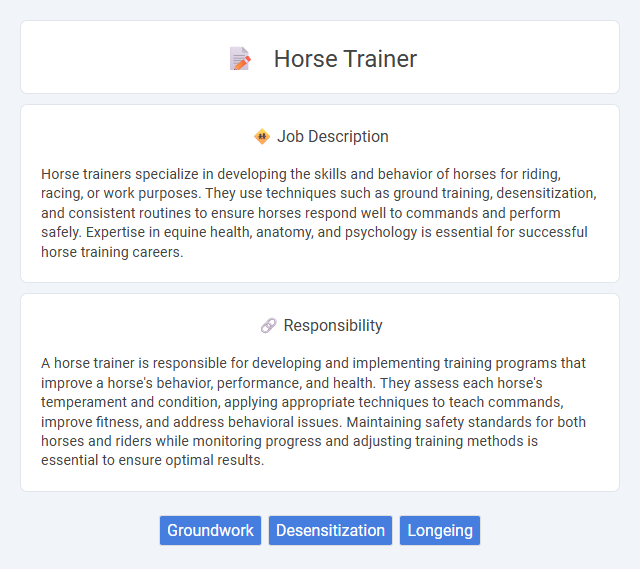
Horse trainers specialize in developing the skills and behavior of horses for riding, racing, or work purposes. They use techniques such as ground training, desensitization, and consistent routines to ensure horses respond well to commands and perform safely. Expertise in equine health, anatomy, and psychology is essential for successful horse training careers.
Individuals with strong physical stamina and a passion for animals are likely suitable for a horse trainer job, as it often involves long hours of manual labor and patience. People who handle stress well and possess excellent communication skills may find this role more fitting due to the need to manage both horses and clients effectively. Those who prefer a sedentary lifestyle or have limited physical endurance might find the demands of horse training challenging and less compatible with their preferences.
Qualification
A horse trainer must possess extensive knowledge of equine behavior, anatomy, and training techniques, typically gained through formal education in animal science or equine studies and hands-on experience. Certification from recognized equestrian organizations, such as the Certified Professional Horseman (CPH) credential, enhances credibility and career prospects. Physical fitness, patience, and strong communication skills are essential traits for effectively training horses and collaborating with owners and riders.
Responsibility
A horse trainer is responsible for developing and implementing training programs that improve a horse's behavior, performance, and health. They assess each horse's temperament and condition, applying appropriate techniques to teach commands, improve fitness, and address behavioral issues. Maintaining safety standards for both horses and riders while monitoring progress and adjusting training methods is essential to ensure optimal results.
Benefit
Horse trainer jobs probably offer numerous benefits, including the opportunity to work closely with animals and develop specialized skills in equine behavior and care. The role likely provides a sense of fulfillment from improving horse performance and health, potentially increasing employment opportunities in competitive racing or equestrian sports. Financial rewards and career advancement might also be possible through building a strong reputation and client base.
Challenge
The role of a horse trainer likely involves managing unpredictable animal behavior, which presents a constant challenge requiring patience and adaptability. Success in this job probably depends on strong observational skills and the ability to tailor training techniques to individual horses. Physical stamina and emotional resilience are also expected to be essential for overcoming daily challenges in this demanding profession.
Career Advancement
A horse trainer career offers significant advancement opportunities through gaining expertise in equine behavior, training techniques, and competition preparation. Progression often involves moving from entry-level assistant roles to leading training programs, managing stables, or specializing in areas such as racehorse conditioning or therapeutic riding. Building a strong professional network and obtaining certifications can accelerate career growth and increase demand in prestigious equestrian circles.
Key Terms
Groundwork
Horse trainers specializing in groundwork develop essential communication and trust between horse and handler through exercises such as lunging, leading, and desensitization techniques. Mastery in groundwork improves a horse's responsiveness, balance, and confidence while promoting safety during riding and handling. Effective groundwork training is foundational for addressing behavioral issues and preparing horses for advanced disciplines.
Desensitization
Horse trainers apply desensitization techniques to gradually expose horses to various stimuli, reducing their fear and reactive behavior. This process involves consistent, controlled exposure to sounds, sights, and touch, enhancing the animal's confidence and safety. Effective desensitization improves training outcomes and strengthens the horse-rider relationship.
Longeing
Horse trainers specializing in longeing use this foundational technique to teach horses balance, rhythm, and obedience. Longeing involves guiding the horse in circular patterns on a long line, enhancing fitness and responsiveness while allowing trainers to assess gait and behavior. Mastery of longeing requires knowledge of correct body positioning, rein control, and effective communication to ensure safety and horse well-being.
 kuljobs.com
kuljobs.com